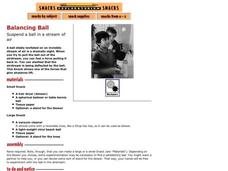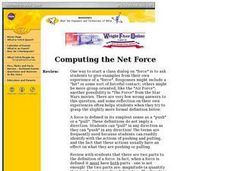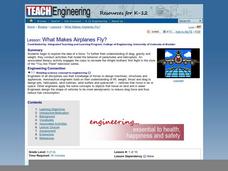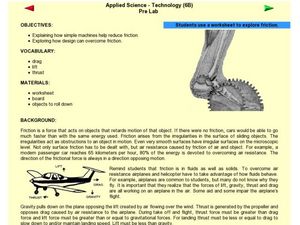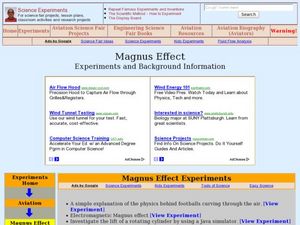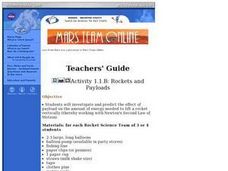Exploratorium
Balancing Ball
Demonstrate lift to the class that is studying aerodynamics. In the stream of air produced by a blow dryer, little physicists place a wad of tissue paper and a spherical figure to compare. Or, if you have a vacuum cleaner and beach ball,...
Curated OER
Wright Again: 100 Years of Flight
Aspiring aeronautical engineers demonstrate different forces as they construct and test paper airplanes. This lesson plan links you to a website that models the most effective paper airplane design, an animation describing the forces...
Teach Engineering
Balsa Glider Competition
Change one variable and try again. Teams build basic balsa gliders and collect data on their flight distances and times. Through collaboration, the team decides on two modifications to make to the basic design and collect data for the...
Curated OER
Computing the Net Force
Adorable little stick figures push and pull a cart of blocks to explain the push and pull of forces. Future physicists then define force and identify it in different situations on the activity that follows. Concepts covered include...
Curated OER
Graphing the Four Forces
Using the Cartesian coordinate system, future flight experts plot points to determine whether or not an airplane will fly. With the four forces of weight, lift, drag, and thrust represented in different quadrants, your physics learners...
Curated OER
The Physics of Flight
Three activities allow young flight engineers to understand the 4 principles of flight (weight, lift, thrust, and drag), to construct a glider, and to create a propeller. Multicultural history and literature are integrated by reading...
Curated OER
Forces of Flight - Lift
Learners design and test paper airplanes to understand the concept of lift and how it affects flight. This technology-based Science lesson is excellent for use with upper-elementary and middle-level learners and uses spreadsheet software...
Curated OER
What Makes Airplanes Fly?
Students examine force and conduct activities that model parachutes and helicopters. In this airplanes lesson plan students identify the forces that make airplanes fly higher and land.
Curated OER
Exploring Aerodynamics
Students explore aerodynamics. For this aerodynamics lesson, students study the flight patterns of three paper airplanes and discover the underlying principles of aerodynamics. Resources and grade level modifications are present.
Curated OER
Applied Science -Technology (6B) Pre Lab
Sixth graders discuss how simple machines overcome friction. In this simple machine lesson, 6th graders review the parts of a plane and how they make up for gravity and friction. They roll different objects down an inclined board...
Curated OER
Boomerangs Keep Coming Back
Students investigate the flight of paper boomerangs. In this flight lesson, students examine the flight variables of paper boomerangs, which they make, by investigating the concepts of lift and drag. They examine what happens when an...
Curated OER
Understanding the Four Forces of Flight
In this four forces of flight instructional activity, students read a 1 page article on flights, answer 5 questions with multiple choice answers, draw a line to connect the four forces to their definitions and answer 1 short answer...
Curated OER
Understanding: Flight
Students review the principles of flight before performing a series of simple experiments. Working in small groups, they complete hands-on activities that demonstrate the principles that make it possible for an airplane to lift into air...
Curated OER
Kite building activity
Students explore how a kite flies; this lesson is a precursor for the windmill activity. By exploring how a kite flies, the students explore the power of the wind; particulary how drag, lifft and gravity enable objects such as kites and...
Curated OER
Causal Patterns in Air Pressure Phenomena Section 3
Students explore lift and Bernoulli's Principle using a relational causal model. Using paper and straws, they investigate lift and relate Bernoulli's Principle to everday occurences.
Curated OER
Lift and Launch Angle
Students engage in a hands-on experiment to determine how launch angles affect airflow around the wing of an aircraft. They view a series of photographs and read information describing the Wright Brothers' experiences. They complete a...
Curated OER
Flight
Students are introduced to the four forces of flight--drag, lift, thrust, and weight--through a variety of fun-filled flight experiments. They "fly" for short periods and evaluate factors that might either increase or decrease their...
Curated OER
What Makes Thing Fly?
Second graders study lift, drag and thrust from a real flight instructor. In this physical science lesson students build and fly paper airplanes and experiment with variations and design.
Curated OER
Frisbee
Students examine the history behind the frisbee and how Bernoulli's principle and Newton's law plays a role. In this flight lesson students complete an experiment on how the rim of a frisbee effects flight.
Curated OER
Hot air Balloons
Students study how hot air balloons were created and the different types there are. In this density and lift lesson students build their own hot air balloon.
Curated OER
Magnus Effect
Learners examine the Magnus effect and its history. In this forces lesson students investigate the lift of a rotating cylinder.
Curated OER
Structure of Flight
For this flight worksheet, high schoolers will review the structures found in organisms that allow them to fly. The function of these structures will also be explored. This worksheet has 10 crossword, 5 true or false, 5 multiple choice,...
Curated OER
Worksheet 4
In this math worksheet, students define the details of a definite integral and how it is used. They also apply math to physics to compute how work for lift is calculated.
Curated OER
Rockets and Payloads
Students investigate Newton's Second Law of Motion as they predict the effect of a payload on the amount of energy needed to lift a rocket vertically. The constraints of the weight of the equipment carried to Mars is compared to the...


